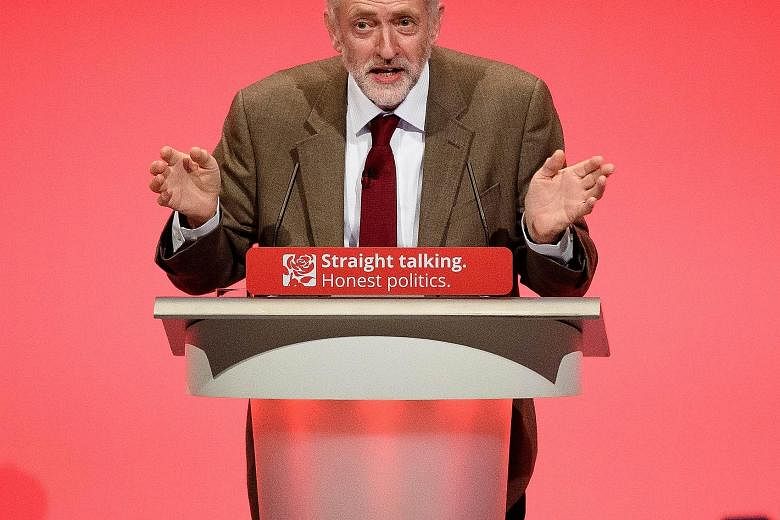Britain's opposition Labour Party has committed itself to a radical left-wing agenda in the first nationwide conference of its members and supporters since it lost a bid to gain power in the May general election.
Dismissing cuts in government expenditure in order to balance the Budget as "the outdated and failed approach of the past", party leader Jeremy Corbyn pledged that if he came to power he will renationalise Britain's privatised railway transport system, scrap the country's nuclear weapons, set up a government investment bank, launch a massive public housing building programme and expand social welfare benefits, all paid for by increased taxes.
But in one of the sharpest public spats between businessmen and politicians in years, Labour's new policy was roundly condemned by those who create wealth in Britain: "Business will not like the thought of an interventionist state propping up failing companies, renationalising utilities, dismantling parts of our defence industry," warned Mr John Longworth, the director general of the British Chambers of Commerce.
After languishing on Labour's far-left fringes for decades, Mr Corbyn overcame stiff opposition from his own MPs and won the Labour leadership largely on the basis of votes cast by the party's rank-and-file members. Since then, Mr Corbyn has been subjected to a virulently hostile media campaign, with tabloid newspapers rounding on him for being unpatriotic after he refused to sing the national anthem in public and avoided bowing to the British monarch, while the broadsheet press denounced his allegedly poor understanding of economics and foreign policy.
In his first speech as party leader this week, Mr Corbyn tried to present himself as a new brand of politician for whom such criticism is irrelevant. He dumped the tradition of British party leaders of parading his smiling wife, and made no sugary references to the "strength and inspiration" provided by his family, as all other British politicians do on such occasions.
He also tried to shake off suggestions that he is unpatriotic by seeking to define his "love of the country and its people" as a new version of "kinder politics" of economic equality which, he claimed, is "more in line with majority British values". And he tried to deflect criticism that he is seeking a return to Britain's failed socialist economic policies of the 1960s and 1970s by accusing the ruling Conservatives of "clinging to the dogmas" of the past.
As an exercise in damage limitation, this was a solid but far from stellar performance. Inexperienced with the autocue technology designed to allow him to read his speech while looking at the audience, Mr Corbyn ended up reading the speaking notes scribbled for his eyes only by his assistants: "Strong message here" he suddenly blurted in mid-speech, for no apparent reason.
Mr Corbyn's aides were also embarrassed when it subsequently emerged that, far from being original, the speech they wrote for their boss contained crucial passages lifted directly from a text written by a freelance journalist as far back as the 1980s, and rejected by no fewer than five previous Labour leaders.
But it was what he failed to say which generated the biggest controversy. For despite his claim to engage in "straight talking", Mr Corbyn did not even mention Britain's budget deficit.
He also brushed aside the need to repay the country's national debt by claiming that "every mainstream economist will tell you that with interest rates so low, now is the time for public investment". And he provided no breakdown for how he proposed to finance the promised construction of 100,000 new social housing units each year should he come to power, beyond claiming that this was "quite simple" and "quite a good idea".
The party members loved the speech and applauded the announcement of new spending pledges. However, the national business community is angered by Mr Corbyn's characterisation of the UK's national economic growth, currently one of the best in Europe, as "unbalanced" and "built on a property-fuelled asset bubble".
"We don't recognise Mr Corbyn's characterisation," lashed back Mr John Cridland, boss of the Confederation of British Industry, the country's leading employer organisation. "The recovery is more balanced than he argues. It is not based on a house price bubble but on business investment, which is spurring stronger wage growth and rising living standards."
Doubts about Labour's new left-wing direction are also shared by most of the party's members of Parliament, who disagree with their leader and know that such policies have little chance of being accepted by the electorate.
Still, with the general election not due before the end of the decade, Mr Corbyn's preoccupation at this stage is not to address the electorate but his own left-wing supporter base.

